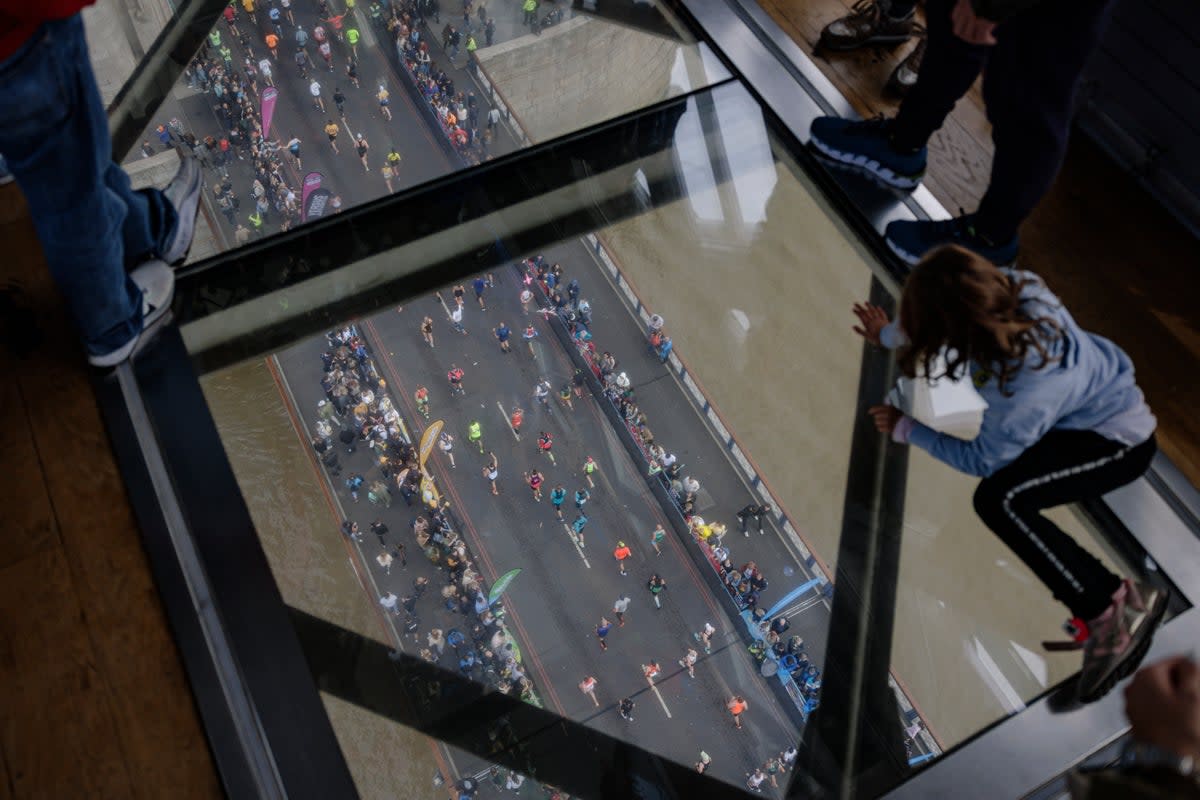How smart sensors, AI and other technology could change the marathon

As runners in the London Marathon picked up their numbers this week, their hearts were – no doubt – beating a little faster than normal, ahead of their big test. One notable heart was among them: Des Linden, Olympian, world record holder and Boston Marathon winner.
But Linden isn't running the race. Instead, her heart thudding away was a hologram, based on a complete digital recreation of her heart, based on MRI scans and other technology. It is a virtual replica of the real thing – what experts call a "digital twin".
The hope is that, in the future, those digital twins allow for their physical counterparts to perform better than ever. This example was created by TCS to celebrate the marathon – but futurists believe that those virtual copies could be made all the way up to the scale of the Earth, allowing them to understand the effect of major interventions without the cost or risk.
It is just one of the many technologies that are transforming the marathon beyond recognition. From new super shoes to the growing use of artificial intelligence, endurance running – perhaps the most simple sport in the world – is rapidly becoming a technological playground that is changing the sport beyond recognition.
That future, however, might not immediately look all that different; if we were transported to watch the marathon in ten or even 50 years, it is still likely to be people running on a road in the same way they have for thousands of years. People still have to run 26.2 miles, even if they have been scanned down to the artery and their digital twin has run it before to ensure their strategies are optimised.
But those runners might have received a recommendation before time that their virtual heart shows that if they spend three hours at a given heartrate, for instance, their performance will fall. Or it might even mean having an AI coach in your ear that knows you better than you know yourself, speculates TCS futurist Bill Quinn – one that can see exactly when you're flagging and not only give you the inspiration you need, but the exact form of words to give you that inspiration.
For now, however, the monitoring technology we have is much better at knowing about you than it is delivering actionable information. The data often "provides data, but not necessarily intelligence", Quinn says. But there are technologies that will make this much better, he hopes: artificial intelligence, for instance, could take those various bits of data and stitch them into something actually useful.
That will depend on having the detailed data in the first place – and much of this sensor technology is already on its way. Even casual runners wear smart watches that monitor them when they're working out and sleeping, pulling together vast amounts of data to give recommendations. Amateurs are now being offered continuous glucose monitors such as Abbott's Lingo, which measure glucose levels during rest and exercise in the hope of giving recommendations on nutrition.
Much of that data lives within its own apps, which can make it harder to get useful recommendations; Quinn notes that it is more a question of having "digital twins" than just one. It is also incredibly personal by its very nature, and customers are increasingly concerned about it. "You have to be really thoughtful about how this data is going to be used, who it's going to be shared with, and how that information is going to be used," notes Quinn – "because there's certainly the potential for that data to be used in somewhat nefarious ways".
A couple of days before the marathon, the International Olympic Committee launched its new AI agenda. While IOC President Thomas Bach noted that athletes are in the unusual position of knowing that AI can't take their jobs, he said that artificial intelligence would come to every part of sport.
It will be useful for spotting talent, for instance, with machine learning able to spot patterns that might suggest a child is particular good at a given sport, for instance. And it will be useful to viewers, too, with TV stations working on AI-powered systems that would be able to summarise events for viewers to catch them up, and automatically edit a quick video of highlights for them.
There is the danger, of course, that all this technology makes the existing inequalities of sport even more stark: just as richer countries can afford more coaches, they can afford more computers. But Christoph Schell – xecutive vice-president and chief commercial officer at Intel, which will be part of the upcoming Olympics – argued that it could help reduce it, too.
He pointed to a project run by Intel in Senegal, which used AI to identify young people who showed particular promise in given sports. At the moment, they would have no "ability at all to access the cloud, to have your data analysed". "Now, if you have access to a mobile phone, you can participate," he said.
A couple of days later and a few miles away, nearly 50,000 people will be queuing up to begin the marathon. Some might do so without any data at all; others will know exactly how much glucose is in their blood and how fast their hearts are beating. Some will have scanned their heart to see exactly how those heartbeats work, and scanned their feet to know exactly how their feet should fall in their £250 supershoes. But they'll all have to run just as far.


